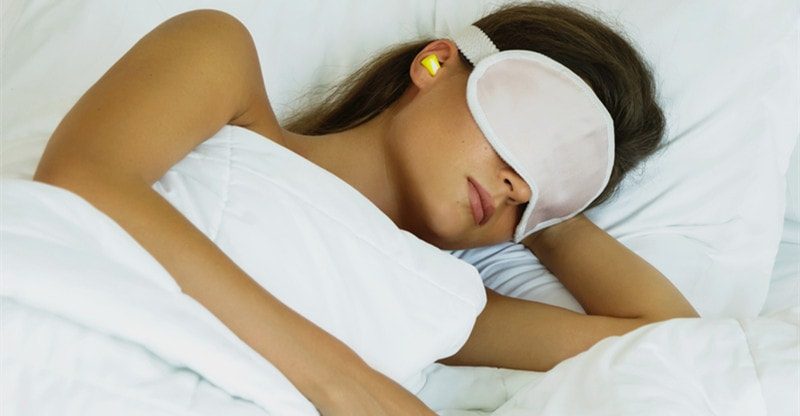5 Easy Tips To Help You Sleep Better At Night
A healthy night’s sleep for the human is as important as a healthy diet. Sleep heals and repairs the heart and blood vessels, according to SleepHealthier.com.
Research shows that poor sleep immediately starts negatively affecting our exercise performance, hormones, and brain function. Sleep deficiency regularly can cause weight gain and increase the risk of kidney disease, heart disease, diabetes, high blood pressure, and stroke in both children and adults.
Over the last few decades, sleep quality and quantity has decreased. About 70% of Americans claim that they experience insufficient sleep at least one night a month. However, 11% claims that they experience insufficient sleep every night.
If you want to take care of your health or lose some pounds, getting a good night’s sleep is the first thing you need to focus on.
Here are some easy tips that will help you sleep better at night.
1. Enhance Your Bedroom Environment
The bedroom environment and its setup are some of the primary factors you need to consider for obtaining a good night’s sleep.
These factors combine noise, external lights, temperature, and furniture arrangement.
Various researches point out that external noise, often from traffic, is the cause of poor sleep and long-term health issues.
A study on the bedroom environment of women states that about 50% of participants experienced improved sleep quality after diminishing the noise and light.
To enhance your bedroom environment, just simply minimize external noise, light, and artificial lights coming from alarm clocks or similar devices. Make sure to make your room quiet, clean, relaxing, and enjoyable place.
2. Increase Bright Light Exposure during the Day
A human body has a natural time-keeping clock known as the circadian rhythm.
It affects our body, brain, hormones and helps us stay awake, and tells our body when it’s time to sleep.
Sunlight or any bright light during the day time enhances your circadian rhythm. This will improve daytime energy and nighttime sleep duration and quality.
A study on older adults says that 2 hours of bright light exposure in the daytime improves sleep efficiency by 80% and the quantity of sleep by 2 hours.
Even if you experience average sleep daily, daily light exposure can help you get better sleep. So, try getting sunlight, if it’s not possible because of your routine, invest in artificial devices and bulbs for bright light.
3. Decrease Blue Light Exposure in the Evening
Light exposure during the day is beneficial, but nighttime light has adverse effects.
This is because of its effect on our circadian rhythm, keep messaging our brain that it’s still the daytime. This decreases hormones which helps you relax and get handsome sleep.
Here are some simple methods to reduce blue light exposure in the nighttime:
- Download an app on your smartphone that blocks blue light.
- Also, download the same functioning app for your computer and laptop.
- Turn off bright lights and do not watch TV before two hours of heading to bed.
4. Reduce Irregular Daytime Naps
Short power naps are advantageous. However, long or irregular naps during the day can badly affect our sleep.
Having slept in the daytime can disturb your mind’s clock, which means you may struggle to sleep at night.
In a study, participants after taking daytime naps ended up being sleepier during the day.
However, some research says that some peoples instead of taking regular daytime naps do not experience disrupted sleep or poor sleep at night.
So, daytime naps are not proven to affect your night sleep. However, they may affect it. The effects of napping vary in individuals.
5. Take a Melatonin Supplement
Melatonin is a hormone in our body that indicates our brain when it’s time to sleep and relax.
A melatonin supplement is one of the easiest methods to enhance our sleep quality.
These supplements are commonly used to treat insomnia.
A study says that consuming 2 mg of melatonin before heading to bed for sleeping can improve your sleep quality and energy the next day.
In another study, about half of the people fell asleep faster and experienced a 15% increase in sleep quality.
Melatonin is available in large quantities at stores or online. However, in some countries to get melatonin, you need a prescription. Take about 1-5 mg before 30-60 minutes of going to bed.
Don’t take a great amount of melatonin at the start. Begin with a low dose to assess your tolerance and then increase it as per your needs. Melatonin may alter brain chemistry, so don’t forget to contact a healthcare provider before using it. Also, speak with them before using it as a sleep aid for your child.
Also, if you are using a continuous positive airway pressure (CPAP) machine and mask to aid your sleep, be sure to find the right CPAP mask. Many users of CPAP masks stop using it because of the discomfort they experience. It is very important to work with your sleep technician on selecting the best mask to ensure undisturbed sleep.



